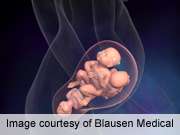Study discusses ethics of multifetal pregnancy reduction

(HealthDay)—Given the risks of multifetal pregnancies, especially high-order multifetal pregnancies, physicians should be aware of the relevant ethical issues in order to support their patients as they make decisions regarding multifetal pregnancy reduction, according to a Committee Opinion published in the February issue of Obstetrics & Gynecology.
The American College of Obstetricians and Gynecologists' Committee on Ethics reviewed the ethical issues pertaining to multifetal pregnancy reduction and have presented an ethical framework for physicians to assist in counseling patients.
The authors note that fertility treatments have contributed to the increase in multifetal pregnancies, and that strategies to prevent multifetal pregnancies should be employed by all fertility physicians. Multifetal pregnancies increase risks to both mothers and neonates, with higher risks presented by high-order versus twin pregnancies. Physicians should be aware of the risks of multifetal pregnancy, the potential benefits of multifetal pregnancy reduction, and the ethical aspects of these issues. Women with high-order multifetal pregnancies should be offered counseling, from resources including perinatologists, neonatologists, mental health professionals, and clinicians with experience in multifetal pregnancy reduction. Physicians should respect patient autonomy and allow the patient to balance the relative importance of the medical, ethical, religious, and socioeconomic factors. Patients should be referred for consultation in a timely manner to discuss the risks and benefits of reducing multifetal pregnancy, and the referring practitioner should maintain continuity of care.
"Whether or not physicians choose to participate in multifetal pregnancy reduction, they should be knowledgeable about this procedure and be prepared to react in a professional and ethical manner to patient requests for information, intervention, or both," the authors write.
More information:
Abstract
Full Text (subscription or payment may be required)
Copyright © 2013 HealthDay. All rights reserved.














